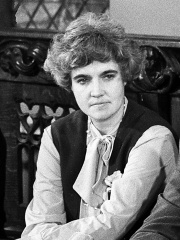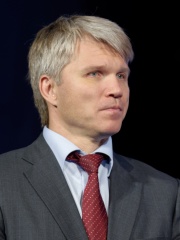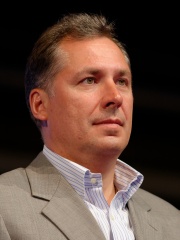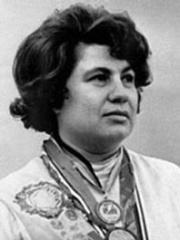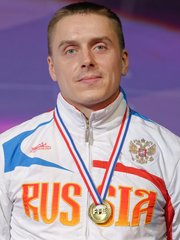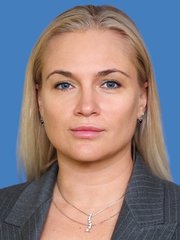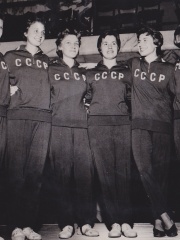
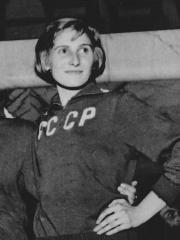

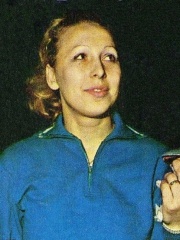
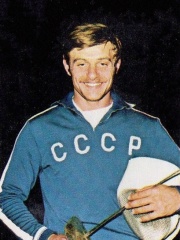

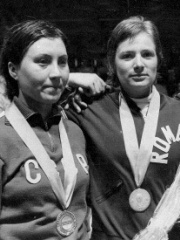

The Most Famous
FENCERS from Russia
Top 10
The following people are considered by Pantheon to be the top 10 most legendary Russian Fencers of all time. This list of famous Russian Fencers is sorted by HPI (Historical Popularity Index), a metric that aggregates information on a biography's online popularity. Visit the rankings page to view the entire list of Russian Fencers.

1. Alexandra Zabelina (1937 - 2022)
With an HPI of 58.57, Alexandra Zabelina is the most famous Russian Fencer. Her biography has been translated into 22 different languages on wikipedia.
Alexandra Ivanovna Zabelina (Russian: Александра Ивановна Забелина; 11 March 1937 – 27 March 2022) was a Soviet fencer. She won gold medals in the team foil at the 1960, 1968 and 1972 Summer Olympics. Between 1956 and 1971 Zabelina won eight team and two individual world titles in the foil. She won the individual Silver Prize at the 1961 and 1966 world championships and team Silver Prize in 1959, 1962, 1967, and 1969. She missed the 1964 Summer Olympics because she was expecting her son. Zabelina first trained in gymnastics, but had to quit due to an injury. In retirement she worked as a fencing coach. Her students included the Olympic champion Maria Mazina.

2. Valentina Prudskova (1938 - 2020)
With an HPI of 56.77, Valentina Prudskova is the 2nd most famous Russian Fencer. Her biography has been translated into 18 different languages.
Valentina Aleksandrovna Prudskova (Russian: Валентина Александровна Прудскова; 27 December 1938 – 23 August 2020) was a Soviet fencer. She won gold in the women's team foil event at the 1960 Summer Olympics and a silver in the same event at the 1964 Summer Olympics. Prudskova's mother, Zinaida Nikolaevna Prudskova, was a farmer and housewife. Her father, Aleksandr Petrovich Prudskov, worked at railways and fought in the Winter War and World War II; he died of pneumonia in 1950, aged 40. Shortly after that, his family moved from Yershov to Saratov, where Prudskova started training in fencing, together with her cousin. Her career advanced in 1954 when she won her first national title. Prudskova was a member of the Soviet foil team from 1957 to 1966. During those years she won four gold and two silver team medals at the world championships, as well as one individual bronze. In 1962 she graduated from Saratov State Technical University with a degree in metal processing and then until 1969 worked at a metalworking plant in Saratov. After that she coached fencing at a sport school. She was awarded the Order of the Badge of Honour and Medal "For Labour Valour". Prudskova had a daughter, Marina, who worked as an arts teacher.

3. Viktor Zhdanovich (b. 1938)
With an HPI of 56.48, Viktor Zhdanovich is the 3rd most famous Russian Fencer. His biography has been translated into 23 different languages.
Viktor Frantsevich Zhdanovich (Russian: Виктор Францевич Жданович) (born 27 January 1938, Leningrad) is a Soviet and Russian fencer. He was World Champion four times (1959, 1960, 1961 and 1963) and twice Olympic Champion (1960) in the foil individual events, and in 1964 in the foil team gold medal.

4. Elena Belova (b. 1947)
With an HPI of 56.46, Elena Belova is the 4th most famous Russian Fencer. Her biography has been translated into 27 different languages.
Elena Dmitriyevna Novikova-Belova (Russian: Елена Дмитриевна Новикова-Белова, née Novikova, born 28 July 1947) is a retired Russian foil fencer, known professionally simply as Elena Belova. She competed at the 1968, 1972, 1976 and 1980 Olympics in the individual and team events and won four gold, one silver and one bronze medal, becoming the first female fencer to win four Olympic gold medals. She nearly won a fifth gold in 1976, but lost her last pool match to the last-placed fencer. Belova also won eight world titles, individually in 1969, and with the Soviet team in 1970–1979. Shortly before the 1968 Olympics, she married Vyacheslav Belov, a future world champion in modern pentathlon, and hyphenated her last name from Novikova to Novikova-Belova. She retired after the 1980 Olympics, and gave birth in 1987, aged 40. After divorcing Belov, she married her second husband, composer Valery Ivanov, who devoted a waltz to her, while keeping the surname Novikova-Belova. In 1970, Belova graduated from the Minsk Institute of Pedagogy, she holds a PhD in this discipline. In 1997 she was awarded the Olympic Order in Silver, and in 2007 the Pierre de Coubertin Medal. On 14 May 2021, Jovian asteroid 24426 Belova, discovered by astronomers with the LINEAR program in 2000, was named in her honor.
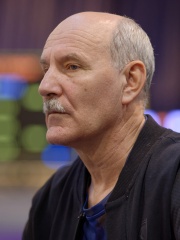
5. Alexandr Romankov (b. 1953)
With an HPI of 55.61, Alexandr Romankov is the 5th most famous Russian Fencer. Her biography has been translated into 19 different languages.
Alexandr Anatolyevich Romankov (Belarusian: Аляксандр Анатольевіч Раманькоў, romanized: Alyaksandr Anatolyevich Ramankow; Russian: Александр Анатольевич Романьков, romanized: Aleksandr Anatolyevich Romankov) is a former Belarusian fencer from the former Soviet Union, who was born on 7 November 1953 in the town of Korsakov on the island of Sakhalin (just north of Japan). He trained at Dynamo in Minsk and won a gold medal, two silver medals and two bronze medals at the three Olympic Games that he competed in between 1976 and 1988 ) .

6. Viktor Sidyak (b. 1943)
With an HPI of 55.57, Viktor Sidyak is the 6th most famous Russian Fencer. His biography has been translated into 18 different languages.
Viktor Aleksandrovich Sidyak (Russian: Ви́ктор Алекса́ндрович Сидя́к; born 24 November 1943) is a Russian former left-handed sabre fencer, a pupil of Mark Rakita and David Tyshler. He was known for his aggressive style and the "one-and-a-half tempo attack".

7. Umyar Mavlikhanov (1937 - 1999)
With an HPI of 55.41, Umyar Mavlikhanov is the 7th most famous Russian Fencer. His biography has been translated into 16 different languages.
Umyar Mavlikhanov (Russian: Умяр Абдуллович Мавлиханов; 24 September 1937 – 14 July 1999) was a Soviet fencer. He won gold in the team sabre events at the 1964 and 1968 Summer Olympics and a bronze in the individual sabre in 1964.

8. Olga Knyazeva (1954 - 2015)
With an HPI of 54.18, Olga Knyazeva is the 8th most famous Russian Fencer. Her biography has been translated into 22 different languages.
Olga Nikolaevna Knyazeva (Russian: Ольга Николаевна Князева; 9 August 1954 – 3 January 2015) was a Soviet foil fencer. She won a team gold medal at the 1976 Olympics and placed ninth individually. She also won four gold and two silver medals at the world championships between 1973 and 1978. Knyazeva took up fencing in 1966 and between 1972 and 1978, was a member of the Soviet national team. In 1975 she won the World Cup, the European Team Cup, and the team world title, and was named best female fencer of the year by the Fédération Internationale d'Escrime. After retiring from competitions she worked as a fencing coach in Kazan and taught physical education at the Kazan State Finance and Economics Institute. After the 1976 Olympics Knyazeva married Rafael Dubov, who was her childhood friend, a fellow fencer, and later a fencing coach and referee. Their children, son Aleksandr and daughter Nina, also competed in fencing.

9. Vladimir Nazlymov (b. 1945)
With an HPI of 53.78, Vladimir Nazlymov is the 9th most famous Russian Fencer. His biography has been translated into 20 different languages.
Vladimir Aliverovich Nazlymov (born November 1, 1945; Russian: Владимир Аливерович Назлымов) is a former sabre fencer, and coach for the USSR and later the United States, to which he moved in 1991, of Crimean Tatar origin. He won three team Olympic sabre gold medals, and was the head coach of the Soviet Union Military Fencing Team for 14 years. He then coached in the United States, notably for Ohio State University, from which he retired in lieu of termination during an NCAA investigation that found him guilty of aggravated level I violations, sanctioned him, and vacated a number of records of the team and its members. He now serves as a coach at the Nazlymov Fencing Foundation, which was founded by his son and daughter-in-law.

10. Viktor Krovopuskov (b. 1948)
With an HPI of 53.59, Viktor Krovopuskov is the 10th most famous Russian Fencer. His biography has been translated into 22 different languages.
Viktor Alekseyevich Krovopuskov (Russian: Ви́ктор Алексе́евич Кровопу́сков; born 29 September 1948 in Moscow) is a retired sabre fencer, who competed for the USSR. Krovopuskov began fencing at age 13 at the Children and Youth Sport School in Moscow, his first trainer being Igor Chernyshev. In 1967, he joined the Armed Forces Sports Society in Moscow. He was a member of the USSR National Team between 1973 and 1986. At the 1976 Olympics he won gold medals in both the individual and team sabre events. He repeated his performance at the 1980 Summer Olympics, where he, again, won gold medals in both events. Krovopuskov was world champion in individual sabre twice (1978 and 1982), and team sabre five times (1974, 1975, 1979, 1983, and 1985). He also won the World Cup in sabre twice (1976 and 1979). In 1979, he was named the Best Sabre Fencer of the World by the International Fencing Federation. He was awarded the Order of the Red Banner of Labour in 1976 and the Order of Lenin in 1980.
People
Pantheon has 56 people classified as Russian fencers born between 1937 and 2000. Of these 56, 48 (85.71%) of them are still alive today. The most famous living Russian fencers include Viktor Zhdanovich, Elena Belova, and Alexandr Romankov. The most famous deceased Russian fencers include Alexandra Zabelina, Valentina Prudskova, and Umyar Mavlikhanov. As of April 2024, 9 new Russian fencers have been added to Pantheon including Andrey Shuvalov, Dmitry Shevchenko, and Vladislav Pavlovich.
Living Russian Fencers
Go to all RankingsViktor Zhdanovich
1938 - Present
HPI: 56.48
Elena Belova
1947 - Present
HPI: 56.46
Alexandr Romankov
1953 - Present
HPI: 55.61
Viktor Sidyak
1943 - Present
HPI: 55.57
Viktor Krovopuskov
1948 - Present
HPI: 53.59
Svetlana Tširkova-Lozovaja
1945 - Present
HPI: 52.79
Pavel Kolobkov
1969 - Present
HPI: 49.03
Svetlana Boyko
1972 - Present
HPI: 47.59
Andrey Shuvalov
1965 - Present
HPI: 46.43
Stanislav Pozdnyakov
1973 - Present
HPI: 45.30
Dmitry Shevchenko
1967 - Present
HPI: 44.69
Aleksey Frosin
1978 - Present
HPI: 42.60
Deceased Russian Fencers
Go to all RankingsAlexandra Zabelina
1937 - 2022
HPI: 58.57
Valentina Prudskova
1938 - 2020
HPI: 56.77
Umyar Mavlikhanov
1937 - 1999
HPI: 55.41
Olga Knyazeva
1954 - 2015
HPI: 54.18
Vladimir Nazlymov
1945 - Present
HPI: 53.78
Lyudmila Shishova
1940 - 2004
HPI: 53.13
Yury Sisikin
1937 - 2025
HPI: 52.88
Sergey Sharikov
1974 - 2015
HPI: 44.33
Newly Added Russian Fencers (2025)
Go to all RankingsAndrey Shuvalov
1965 - Present
HPI: 46.43
Dmitry Shevchenko
1967 - Present
HPI: 44.69
Vladislav Pavlovich
1971 - Present
HPI: 41.22
Aleksey Dyachenko
1978 - Present
HPI: 38.52
Vyacheslav Pozdnyakov
1978 - Present
HPI: 37.80
Viktoria Nikishina
1984 - Present
HPI: 37.55
Ruslan Nasibulin
1981 - Present
HPI: 36.71
Anton Avdeev
1986 - Present
HPI: 35.59
Yevgeniya Lamonova
1983 - Present
HPI: 34.32
Overlapping Lives
Which Fencers were alive at the same time? This visualization shows the lifespans of the 6 most globally memorable Fencers since 1700.

